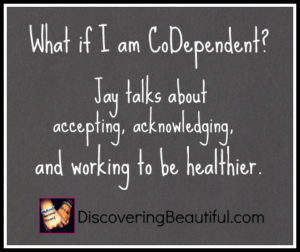
Codependency has a lot of different faces. The phrase that sums up my experience is that
“I’m happy when you are happy, and when you’re in distress, I feel unregulated.”
At just under a year sober I had learned that my girlfriend had relapsed and wasn’t doing too well. We would see each other regularly and never spoke about whether or not she was using. I trusted that when she wanted help she would ask for help, but it broke my heart and I wasn’t as cool as that statement might make me appear.
I worried a lot.
Each time my phone rang I thought it would be someone telling me that something terrible had happened. I created anxiety in my life by trying to be prepared for the worst at all times.
Eventually she asked for help and I brought her to detox.
We weren’t sure that she would stay more than the night but she made the decision to go and I would sleep well that night; or so I thought.
The funny thing about the mind is that it can control the body. At 11 months I was having panic attacks, I was losing focus at work and I was sleeping in broken patterns throughout the night.
Today it’s easy to see in hindsight that I was waiting for the proverbial other shoe to drop– I was waiting for the worst case scenario and I was sleeping lightly because my mind was preparing my body for its “fight or flight” mode, and plus, if I were awake I could rush to her rescue.
For over two months I slept like this.
I became tired throughout the day and kept my ringtone on the highest volume.
During conversations with friends I would scour for service, refreshing my connection to make sure I hadn’t missed any calls or voice mails. I didn’t trust that the universe was taking care of her and I stopped meditating.
In a couple’s session her therapist had mentioned a theory she had about our behavior.
She suggested that I was the sick one because I wasn’t being treated for my own illness.
I thought, “Here we go, here it comes. Jay is always wrong. Everyone warned me about couples sessions.”…I felt like I was set up in a position where I would never be right and I would never win. I tried to switch the focus back to the treatment she was or wasn’t getting, and how this would affect her discharge plans.
The therapist said to me, “You’re trying to control this conversation just like you’re trying to control her treatment plan. In codependency, one person takes control and the other person allows the control. Your fear is that if you let go of that control, you will lose her. Her fear is that if she doesn’t allow you that control, she will lose you. Have you ever asked her what she wants?”
Boom.
She was right.
I went on to explain how wrong she was, that I was in recovery and I had the experience and insight that I knew was helpful to my girlfriend. I had the cheat sheet with all of the answers.
She didn’t shame me or try to prove me wrong. My girlfriend simply smiled because she had heard the truth and knew it to be spot on.
Her therapist waited for me after our session and gave me a handout on codependency and emotional regulation.
It explained a lot.
It was difficult for me to see. It was difficult to admit.
I hadn’t realized these methods weren’t effective. I was becoming a teacher rather than a supportive boyfriend. I wasn’t listening anymore because I was preparing my response. I always thought there was a perfect combination of phrases for any situation that could dissolve any conflict or confusion.
I found safety within this line of reasoning.
What a difficult pill to swallow to learn it wouldn’t work any longer.
Everyday I meditate and talk to my network of support and try to set the tone to go with the flow of things rather than holding on too tightly to what I believe. For my meditations I began using mantras like “everything is as it should be” or “go with it.”
Acceptance is one of those things that I needed to commit to. It’s hard to accept because it’s hard to let go of my defenses. For me, acceptance today means that my happiness isn’t derived from the happiness or well-being of my girlfriend.
My happiness is derived from the effort I put into being happy and healthy. For me.
Codependency can be subtle or it can be painfully obvious.
An outside perspective with someone you trust is a sure fire way to discover how healthy and helpful your communication techniques and relationship style is. The most important thing isn’t to be discouraged if you’ve found you’re skewed to the codependent side.
The important part is realizing what the problems are, and being willing to work work on letting go of them.
Your relationship will only grow if you allow it the space to do so.
Jay is 27 years old and has been sober for over 1 year.
He is an alumni at Atlas Recovery House, a non-12 step-based program in Los Angeles, where he also works. In his free time he likes to play music and enjoys going to concerts.
Great input Jay. Thank you for contributing. I was unable to see my issue in romantic relationships. I was fortunate to have the good advice to take a year away from them so I could learn to love myself so to speak. It is so true that these relationships where we rely utterly on others keep us from doing the necessary work on ourselves. Enjoyed this read.